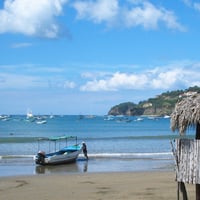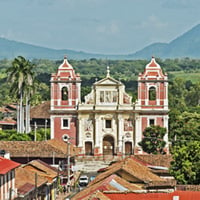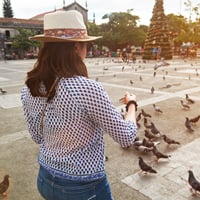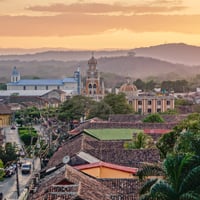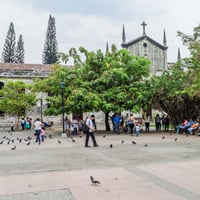Nicaragua
Coastal BeachesNicaragua, officially known as the Republic of Nicaragua, is the largest country in Central America, bordered by Honduras to the north, Costa Rica to the south, the Pacific Ocean to the west, and the Caribbean Sea to the east. The country's diverse geography includes lakes, volcanoes, and rainforests, fostering a rich biodiversity. Nicaragua's landscape is marked by two major regions: the Pacific lowlands, characterized by fertile valleys and plains, and the North-Central highlands, home to the country's coffee and tobacco production. The eastern region, known as the Mosquito Coast, is sparsely populated and has a tropical rainforest climate. The capital and largest city, Managua, lies on the southwestern shore of Lake Managua and is the country's political, cultural, and economic center. Nicaragua's population is a mix of indigenous peoples, Europeans, Africans, and Asians, creating a multicultural and multilingual society, with Spanish being the official language. Nicaragua's history is filled with periods of political unrest, dictatorship, and revolution, most notably the Sandinista revolution in the late 20th century. Despite its tumultuous past, the country has made strides toward political stability and economic growth. Tourism is a growing industry, with visitors drawn to its historical sites, such as the colonial cities of Granada and León, as well as its natural attractions, including the volcanic island of Ometepe and the Corn Islands in the Caribbean. The economy is primarily based on agriculture, with coffee, beef, and gold being significant exports. However, Nicaragua remains one of the least developed countries in the Americas, with a significant portion of its population living below the poverty line. Efforts to improve education, healthcare, and infrastructure are ongoing challenges for the Nicaraguan government. Despite these challenges, Nicaraguans are known for their warmth and hospitality, and the country's rich cultural heritage is expressed through its music, dance, and cuisine. Traditional dishes such as gallo pinto (a rice and beans mixture), nacatamales (Nicaraguan tamales), and vigorón (a cabbage salad with yucca and pork rinds) reflect the fusion of indigenous and Spanish influences. Nicaragua's political scene remains dynamic, with debates over governance, social policies, and relations with other nations. The country continues to navigate its path toward sustainable development, balancing economic growth with the preservation of its natural resources and cultural identity.
 PassportCard Expat Health Insurance
PassportCard Expat Health InsuranceGet Quote
Never worry about paying your medical bills out of pocket again. The innovative PassportCard allows for a stress-free experience for all expat families, remote travelers, and workers. With a 24/7 customer service and an outstanding customer base of over 2 Million clients, it will feel like medical care at home. Get up to 10% off on your policy now.
 PassportCard Expat Health Insurance
PassportCard Expat Health InsuranceNever worry about paying your medical bills out of pocket again. The innovative PassportCard allows for a stress-free experience for all expat families, remote travelers, and workers. With a 24/7 customer service and an outstanding customer base of over 2 Million clients, it will feel like medical care at home. Get up to 10% off on your policy now.
Get Quote
Living in Nicaragua
Best Places to Live in Nicaragua
Visa & Residency
Obtaining a residency in Nicaragua is a process that involves several steps and the submission of various documents. The most common types of residency visas for expats are the Pensionado Visa and the Rentista Visa. The Pensionado Visa is designed for retirees who receive a pension from a foreign government or private company. To qualify, applicants must prove a monthly income of at least $600 from a pension or retirement fund. The Rentista Visa is for individuals who have a stable and permanent income from investments or personal businesses outside of Nicaragua. The required monthly income for this visa is $750. The process for both visas is similar. Applicants must first gather the necessary documents, which typically include a passport valid for at least six months, a police record from the applicant's country of origin, health certificates, proof of income, and various application forms. All documents from outside Nicaragua must be notarized and authenticated by the Nicaraguan consulate in the country of origin. Once the documents are prepared, the applicant must submit them to the Nicaraguan authorities, either in person or through a legal representative. The authorities will review the application and may request additional information or clarification. After the review, the immigration office will issue a resolution. If approved, the applicant will receive a cedula, or residency card, which is typically valid for one year for the first issuance and can be renewed annually. The process can be average in terms of difficulty, as it requires a fair amount of paperwork and understanding of the legal requirements. It is advisable to seek assistance from a or a professional familiar with Nicaraguan immigration laws to navigate the process effectively. The time frame for approval can vary, but it generally takes a few months from the submission of the application to the issuance of the residency card. It is important to note that the Nicaraguan government encourages foreign investment and residency, which can make the process smoother for those who contribute to the local economy.
Healthcare in Nicaragua
The healthcare system in Nicaragua is a mix of public and private services. The public healthcare system is overseen by the Ministry of Health (MINSA) and provides services to citizens at low or no cost. However, the quality of public healthcare can vary significantly, with urban areas typically having better facilities and more resources than rural areas. Public hospitals and clinics often face challenges such as overcrowding, limited medical supplies, and understaffing. Private healthcare in Nicaragua offers higher quality services with more modern facilities and equipment, and shorter wait times, but at a higher cost. Expats and digital nomads can access public healthcare by contributing to the social security system, but many opt for private health insurance or pay out-of-pocket for private care to ensure higher quality and faster service.
Cost of Living
The cost of living in Nicaragua is generally low compared to many other countries, making it an attractive destination for expatriates and retirees looking for an affordable lifestyle.
Weather
Nicaragua has a tropical climate with two distinct seasons: the dry season and the rainy season. The dry season runs from November to April, and the weather is generally hot and dry. The rainy season, from May to October, is characterized by afternoon showers and cooler temperatures. Coastal areas tend to be hotter and more humid, while the central highlands are cooler and more temperate.
Educational System in Nicaragua
The educational system in Nicaragua is structured similarly to many Latin American countries and has undergone various reforms to improve its quality and accessibility. Education in Nicaragua is compulsory from the ages of 6 to 12, which corresponds to primary education. Secondary education typically starts at age 13 and is divided into two cycles: the first three years (basic secondary) and the last two years (diversified secondary), which may have a vocational or academic focus. The school year in Nicaragua runs from February to November. Public education is free at the primary and secondary levels, but schools often lack sufficient resources, and families may need to pay for uniforms, books, and other supplies. Private schools, including international schools that offer curricula from other countries such as the United States or the International Baccalaureate, are available and are often the choice for families who can afford them. These schools usually offer higher-quality facilities and resources. Upon completion of secondary education, students receive a Bachillerato, which is necessary to enter university. The quality of education can vary significantly between urban and rural areas, with rural schools facing more challenges such as lower attendance and completion rates.
Copyright 1997-2025 Burlingame Interactive, Inc.

